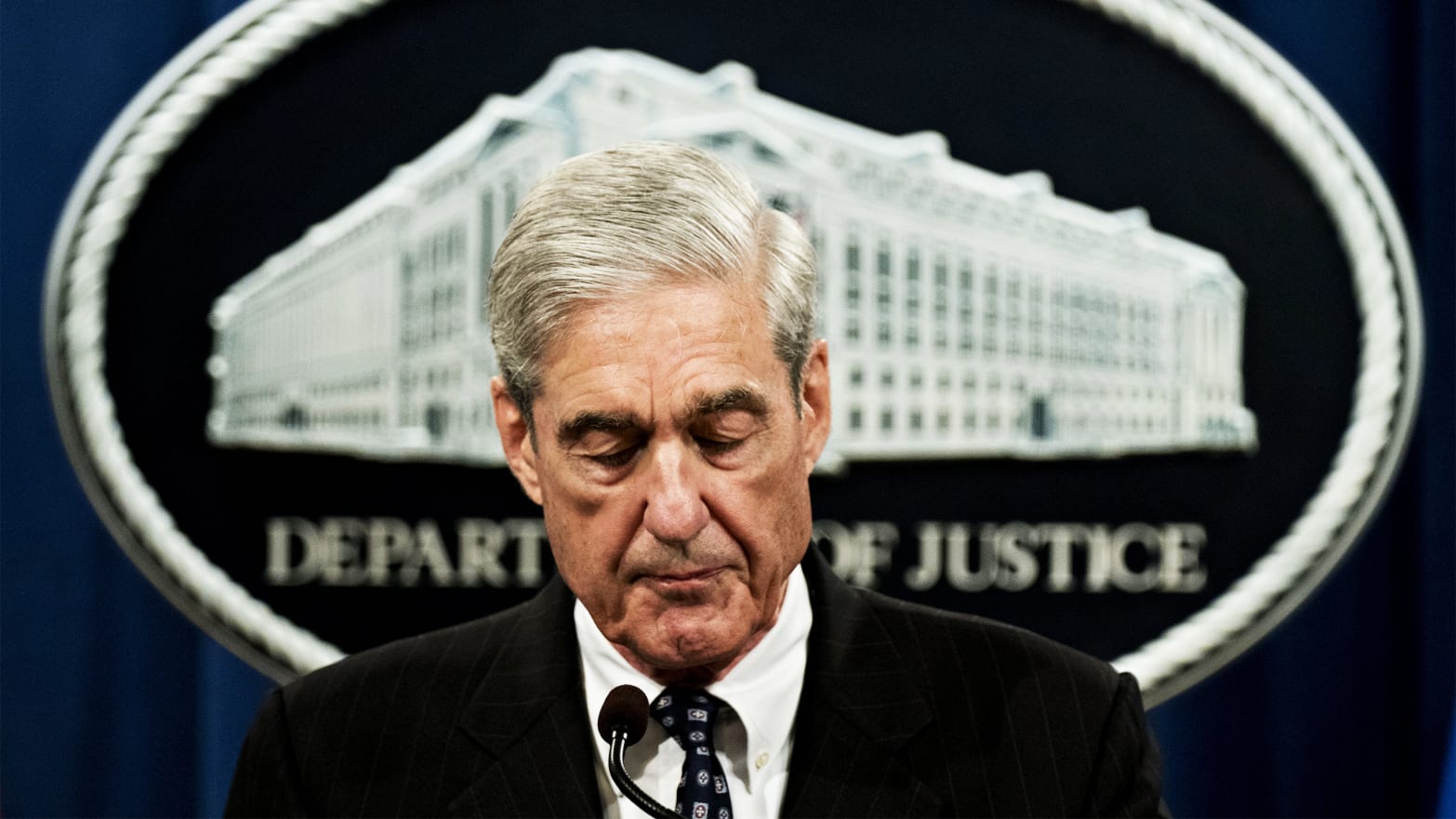Special Counsel Robert Mueller broke more than two years of silence on Wednesday to address the central mystery of his investigation: why he did not make a determination about whether President Trump broke the law.
Mueller said it was because his hands were tied by Justice Department policy that forbids indictment of a sitting president—a statement already being interpreted as an invitation for Congress to impeach Trump.
“Charging the president with a crime was therefore not an option we could consider,” he said in a surprise press conference at DOJ headquarters.
The special counsel investigation reported 10 episodes of possible obstruction-of-justice offenses allegedly committed by Trump, including the president’s failed efforts to fire Mueller. At the press conference, Mueller said the lack of an official charge of misconduct against Trump should not be interpreted as an exoneration—as Trump and his allies have endlessly claimed.
“If we had had confidence the president clearly did not commit a crime we would have said so,” Mueller said.
Instead, Mueller said “the Constitution requires a process other than the criminal justice system to formally accuse a sitting president of wrongdoing.”
Trump tweeted he was innocent, following Mueller’s statement.
House Judiciary Committee Chairman Jerry Nadler said the onus is now on Congress to act.
“Given that Special Counsel Mueller was unable to pursue criminal charges against the president, it falls to Congress to respond to the crimes, lies and other wrongdoing of President Trump—and we will do so,” he said in a statement. “No one, not even the president of the United States, is above the law.”
Rep. Justin Amash, the first Republican lawmaker to call for impeachment, tweeted: “The ball is in our court, Congress.”
Mueller’s statement was in contrast to Attorney General William Barr’s previous comments about the DOJ policy in question, an opinion from the Office of Legal Counsel (OLC). When Barr gave a press conference before the public release of Mueller’s report, he said he asked Mueller multiple times if the special counsel would have charged Trump absent that OLC opinion.
“[H]e made it very clear several times that that was not his position,” Barr said at the time. “He was not saying that but for the OLC opinion, he would have found a crime. He made it clear that he had not made the determination that there was a crime.”
Barr essentially asked Mueller if he had conducted a thought experiment. Mueller said Wednesday he did not conduct such an experiment, noting that the OLC opinion says Congress is constitutionally authorized to handle the alleged crimes of sitting presidents.
But after Mueller told Barr he had not conducted such a thought experiment, Barr went ahead and did it himself.
Barr said he concluded that even absent the OLC opinion, the Justice Department still wouldn’t have charged Trump. Mueller said he had nothing to do with Barr’s analysis.
“That was the office’s final position and we will not comment on any other conclusions or hypotheticals about the president,” he said, clearly alluding to Barr.
Mueller also dismissed calls for him to appear before Congress to testify on his office’s findings.
“Any testimony from this office would not go beyond our report,” he said. “It contains our findings and analysis and the reasons for the decisions we made. We chose those words carefully and the work speaks for itself.” He concluded: “The report is my testimony.”
Ever since the report’s release, Democrats on the House Judiciary Committee have been battling the Justice Department for access both to Mueller and the un-redacted report. Nadler has pushed the department to schedule testimony from Mueller, but no date has been set. He was noncommittal when asked if he plans to subpoena Mueller.
“Mr. Mueller told us a lot of what we need to hear today,” Nadler said at a press conference.
The special counsel also defended the investigation into Russian influence, a thinly veiled response to years of allegations from Trump that the entire thing was a “witch hunt” based on a “hoax.” His office charged dozens of Russian military officers with conspiracy to illegally influence the 2016 election.
“The indictments allege, and the other activities in our report describe, efforts to interfere in our political system. They needed to be investigated and understood. That is among the reasons why the Department of Justice established our office.”
Investigating acts of obstruction and lying were inseparable from his mandate, Mueller said.
“The matters we investigated were of paramount importance. It was critical for us to obtain full and accurate information from every person we questioned. When a subject of an investigation obstructs that investigation or lies to investigators, it strikes at the core of the government’s effort to find the truth and hold wrongdoers accountable.”
Mueller said his investigation is complete and he would be closing his office and resigning from the Justice Department to “return to private life.”
The statement was Mueller’s first public, on-camera comments since he was appointed as special counsel in 2017 to investigate Russian efforts to meddle in the last presidential election. Mueller’s investigation concluded in April when he sent his long-awaited report to Barr.
Mueller’s final report said his team did not establish a criminal conspiracy between the Trump campaign and the Russian government. They did uncover a criminal conspiracy emanating from Moscow to subvert American democracy with the goal of electing Trump.
Barr did not immediately release the report. Instead, he wrote a summary to Congress that Democrats said inaccurately portrayed Mueller’s conclusions as more favorable towards Trump than they actually were.
Mueller then took the extraordinary step of criticizing Barr in a private letter, writing his summary “did not fully capture the context, nature, and substance of this office’s work and conclusions.
Then Mueller asked Barr to immediately release the 448-page report’s executive summaries to clear up the confusion, but he did not. Instead, Barr waited several weeks to release a redacted version of the report—but not before giving a press conference that spun for Trump.
In a contentious Senate hearing after revelation of Mueller’s letter, Barr defended his handling of the report and played down any possibility of tension with Mueller. The letter’s “snitty” tone, he said, suggested that it had been written by special counsel staff rather than Mueller.



